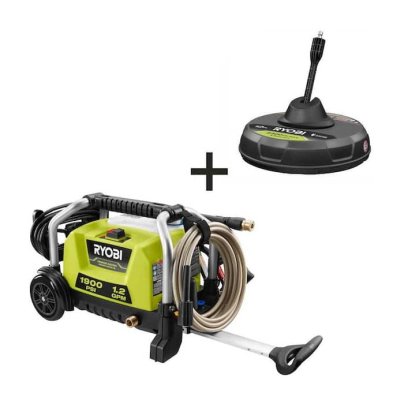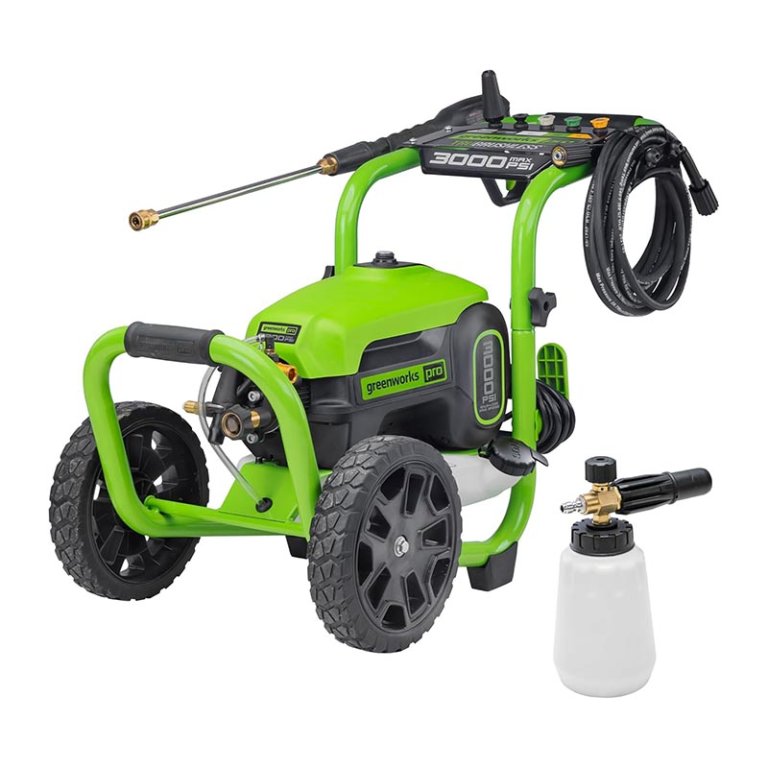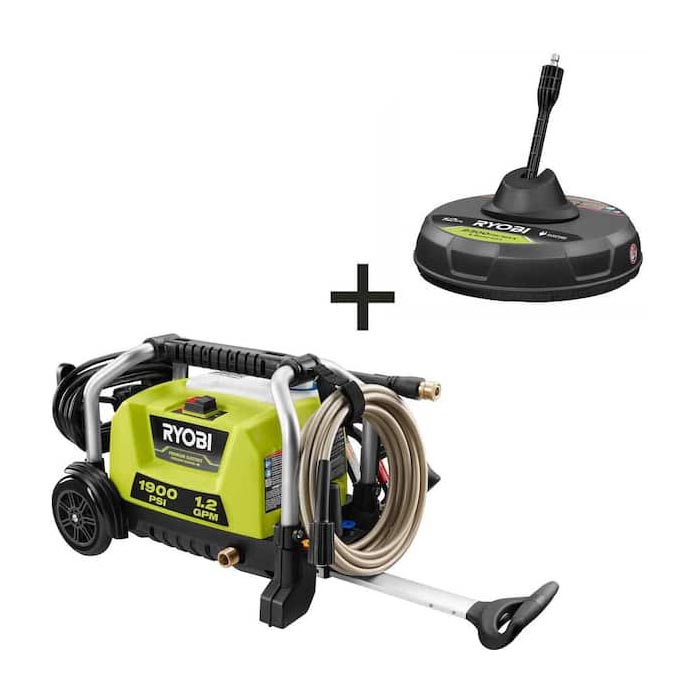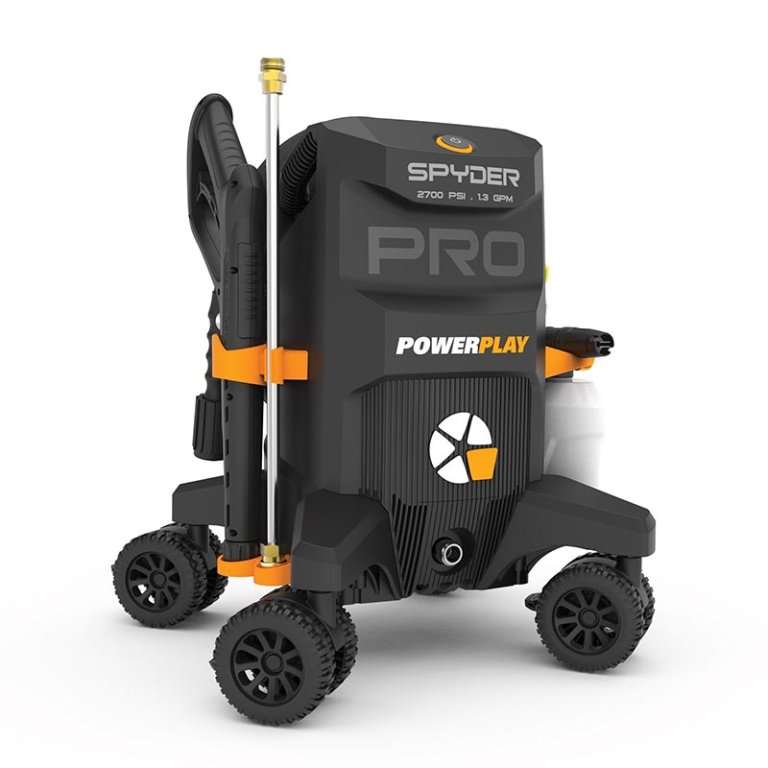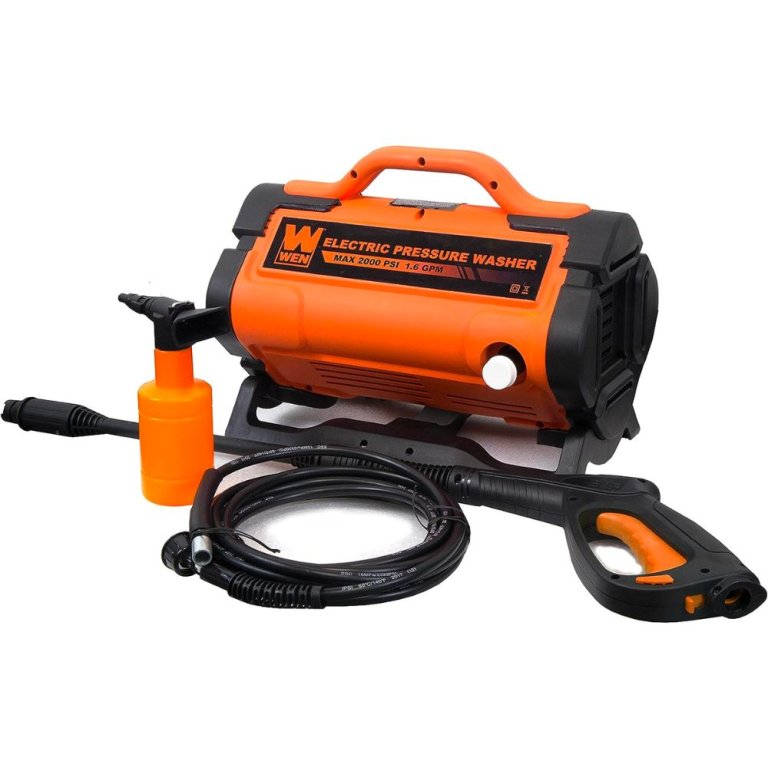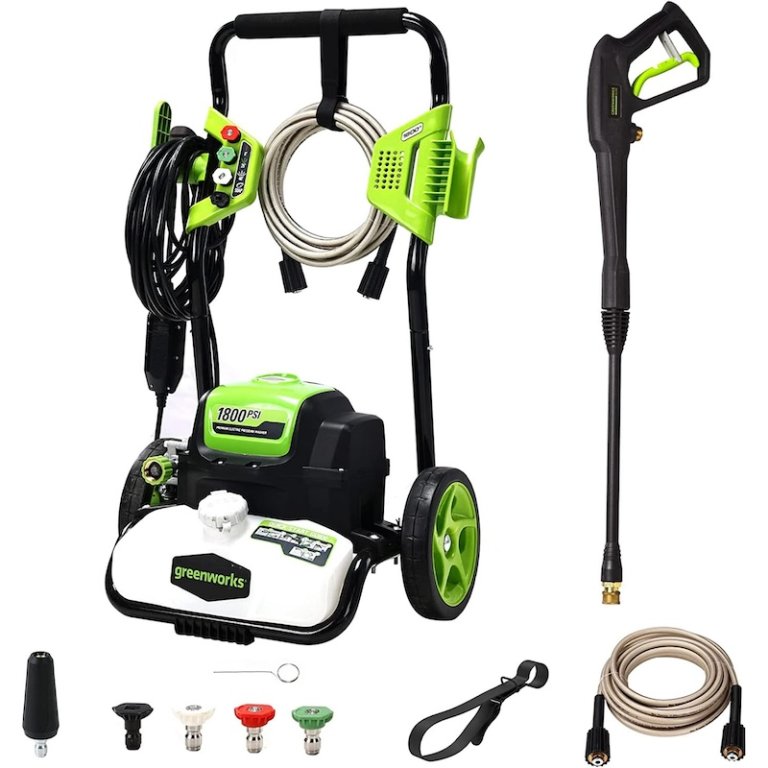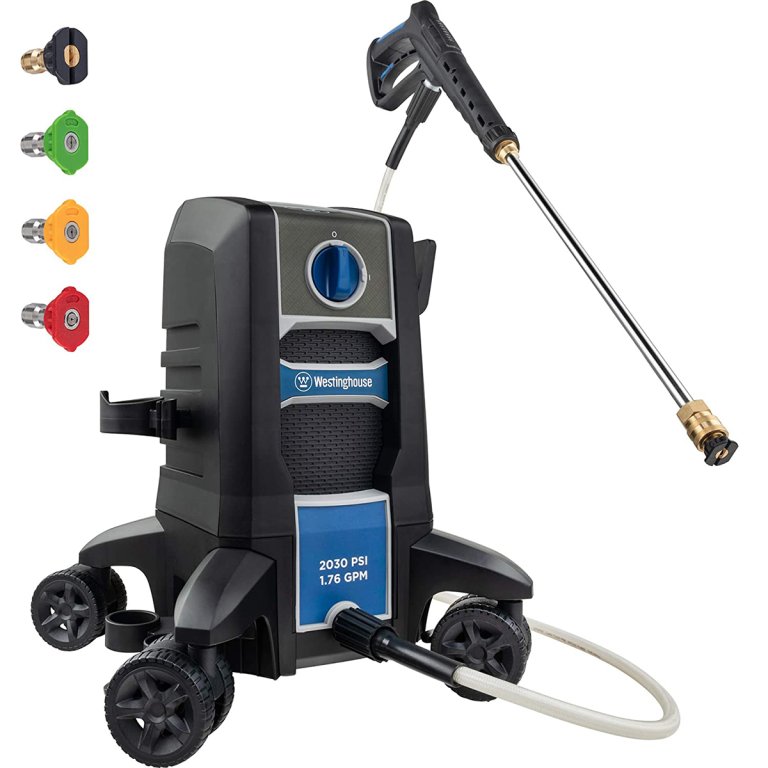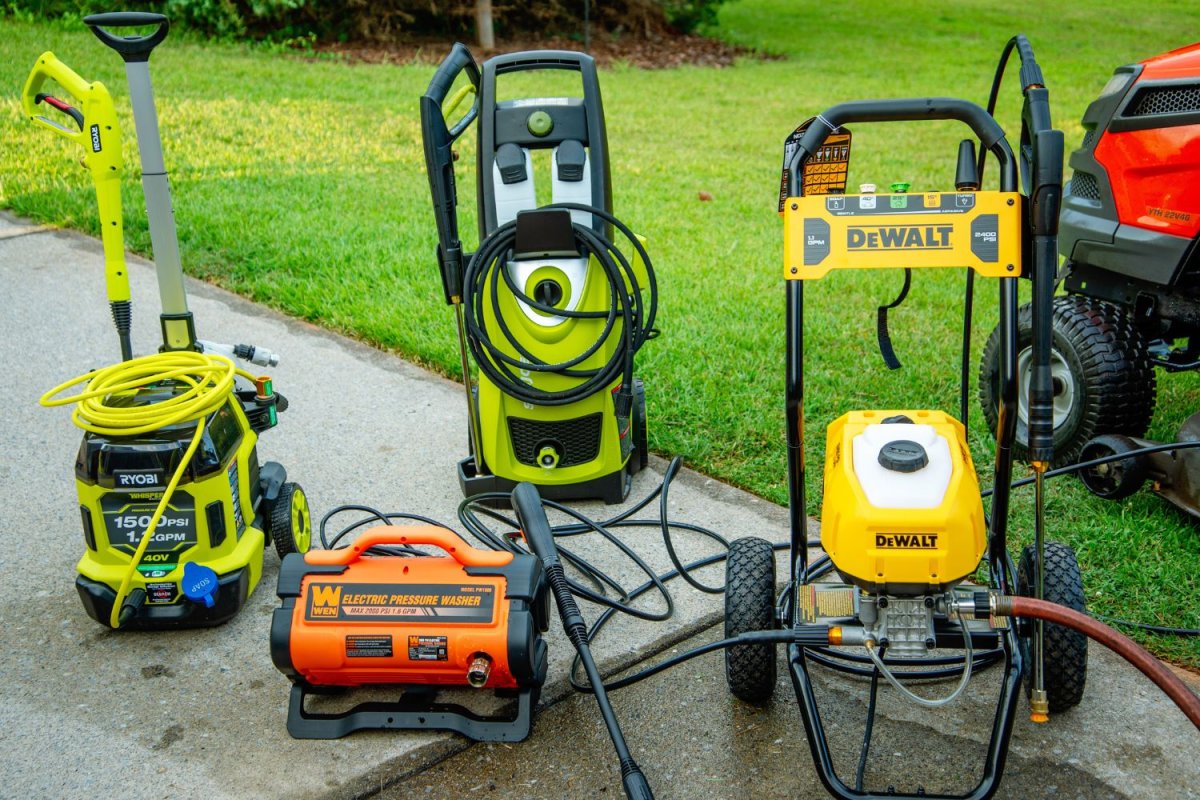
We may earn revenue from the products available on this page and participate in affiliate programs. Learn More ›
An electric pressure washer is a powerful cleaning tool for blasting away grime, mildew and stains on outdoor surfaces. While gas models are often used by pros, electric versions are more affordable, quieter, and easier to store for at-home use.
To find the best ones, we researched dozens of popular pressure washers and then tested eight top-rated models for performance. After 40 hours of cleaning, only seven made our list, and we found a favorite—the Greenworks GPW3000, which delivers 3000 pounds per square inch (PSI), sprays up to two gallons of water per minute (GPM), comes with five nozzles, and features an onboard detergent tank.
Read on for expert shopping tips and our hands-on reviews of the best electric pressure washers available today.
- BEST OVERALL: Greenworks GPW3000 Electric Pressure Washer
↓ Jump to Review - BEST BANG FOR THE BUCK: Ryobi RY1419MT Corded Pressure Washer
↓ Jump to Review - BEST MANEUVERABILITY: Powerplay Spyder Pro 2700 Electric Pressure Washer
↓ Jump to Review - BEST PORTABLE: Wen PW1900 Electric Pressure Washer
↓ Jump to Review - BEST LIGHT-DUTY: Greenworks GPW1800 Electric Pressure Washer
↓ Jump to Review - MOST VERSATILE: Westinghouse ePX3100 Electric Pressure Washer
↓ Jump to Review

Electric Pressure Washers Comparison
| Product | PSI | GPM | Hose Length |
| Greenworks GPW3000 | 3000 PSI | 2 GPM | 25 feet |
| Ryobi RY1419MT | 1900 PSI | 1.2 GPM | 25 feet |
| Powerplay Spyder Pro | 2700 PSI | 1.3 GPM | 25 feet |
| Wen PW1900 | 2000 PSI | 1.6 GPM | 16.5 feet |
| Greenworks GPW1800 | 1800 PSI | 1.1 GPM | 20 feet |
| Westinghouse ePX3100 | 2300 PSI | 1.76 GPM | 25 feet |
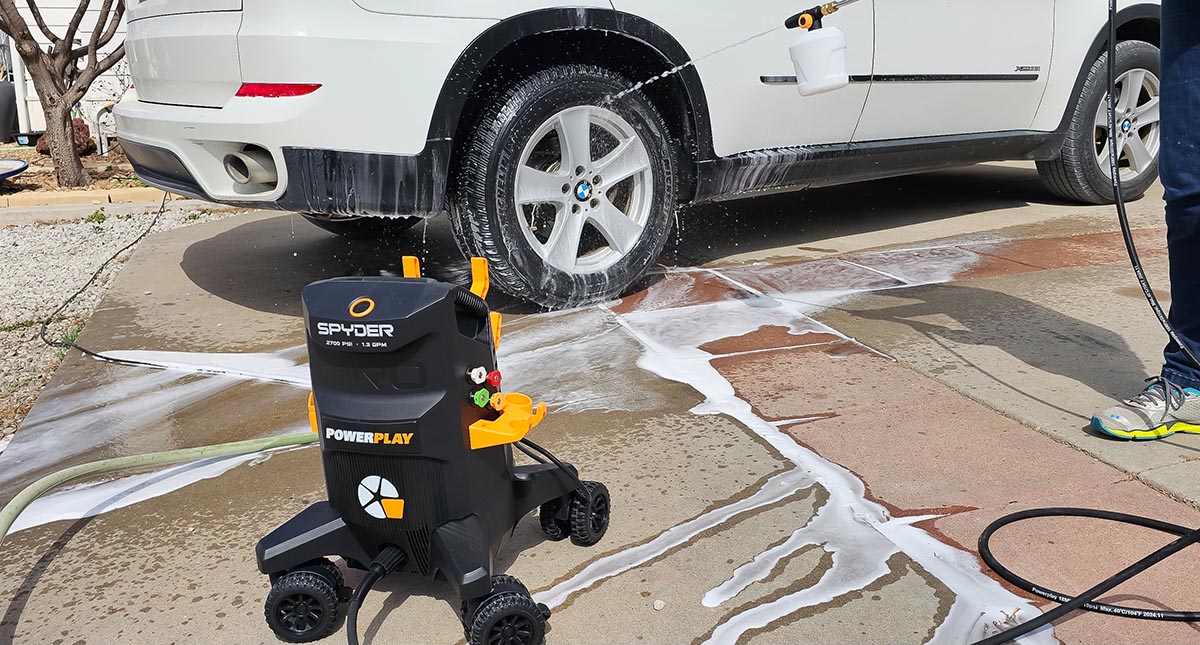


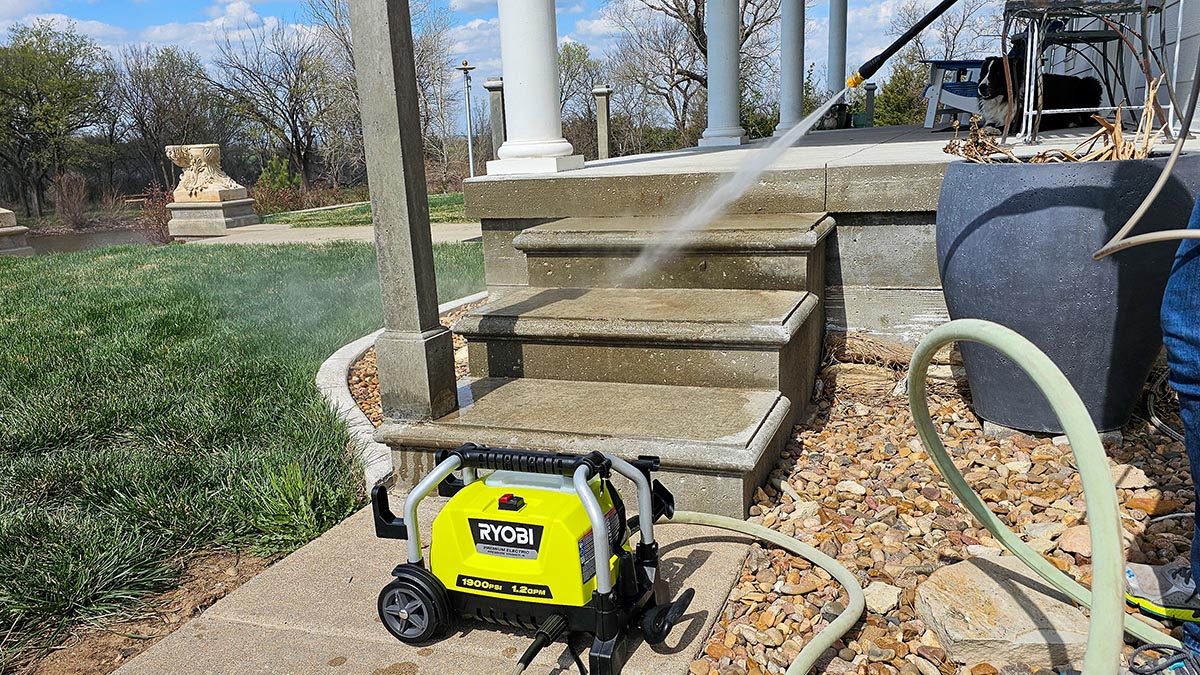
Our Top Picks
We looked at power, portability, cord length, and ease of use during our hands-on tests. See how each electric pressure washer fared in our driveway, sidewalk, and siding-cleaning tests.
Best Overall
Photo: AmazonWhat We Like
- Wheelbarrow-style with low center of gravity
- Pliable 25-foot pressure hose
- Good water volume
- Electric start pressure washer
What We Don’t Like
- Easy to pull but challenging to push
Specs
- PSI: 3000
- GPM: 2.0
- Hose length: 25 feet
Our Ratings: Ease of Use 4.65/5; Performance 5/5; Maneuverability 4.25/5; Noise 4.75/5; Value 4.75/5
Tough jobs like cleaning the driveway, deck, or patio call for a heavy-duty tool like the Greenworks Pro. This high-pressure washer delivers 3000 PSI at 2.0 GPM, quickly blasting away dirt and grime in our driveway-cleaning test. Included in the kit are five spray tips and a soap cannon. An onboard detergent tank holds a full bottle of cleaning solution for direct injection into the spray stream, and the pressure hose is 25 feet long for ample range. We liked the simple push-start button on the top of the motor and the convenient tip storage on the handle.
Built on a tubular steel wheelbarrow-style frame, this unit has a low center of gravity and large 10-inch wheels for stability on uneven ground. But while we found it easy to maneuver while pulling, pushing was a different matter—it had a mind of its own when we tried to push and steer simultaneously.
The highly flexible hose made the Greenworks GPW3000 comfortable to work with. This pressure washer was the most capable of washing concrete, cleaning nearly twice as fast as the next closest performer. Another perk is the ability to store this model vertically along a garage wall when storage space is at a premium.
What our tester says: “I love having the power of a gas pressure washer without having to put up with a loud noise or toxic fumes.” —Glenda Taylor, Product Reviews tester and writer
Get the Greenworks GPW3000 electric pressure washer at Amazon or Greenworks.
Best Bang for the Buck
Ryobi RY1419MT Corded Pressure Washer
Buy at The Home DepotWhat We Like
- Solid performance at an affordable price
- Soap nozzle applies detergent evenly
- Extendable handle and large wheels
- Compact and portable pressure washer
What We Don’t Like
- Not as effective on oily grime as others
Specs
- PSI: 1900
- GPM: 1.2
- Hose length: 25 feet
Our Ratings: Ease of Use 4.75/5; Performance 4/5; Maneuverability 4/5; Noise 4.5/5; Value 4.5/5
There’s no need to spend a lot of money to get great washing power. Ryobi’s compact 1900 PSI pressure washer delivers enough power to blast dirt and mud from concrete using the included turbo nozzle. It also comes with a soap nozzle that evenly distributes bubbly detergent to cars and other items to soften dirt before rinsing away with the included 15-degree pressure nozzle.
We liked the ergonomic design of this pressure washer—it has an extendable handle and large wheels that made it easy to tip and pull as we tested. It also has a handy grab bar along the top, and at just 21 pounds, it’s easy to lift to the back of a pickup bed or put on a shelf for storage.
This small pressure washer wasn’t the most powerful pressure washer we tested, but with the turbo nozzle attached, it cleaned away all but the toughest oily messes. It’s a good option for light-to-medium-duty cleaning, and the 25-foot hose is flexible enough to maneuver without kinking. It was also one of the quietest models we tested.
Get the Ryobi electric pressure washer at The Home Depot.
Best Maneuverability
Powerplay Spyder Pro 2700 Electric Pressure Washer
Buy at Amazon Buy at The Home Depot Buy at Northern ToolWhat We Like
- All-direction wheels for mobility
- High power output
- Foam cannon included
- Long, 35-foot power cord
What We Don’t Like
- Heavier than other models
- Can roll on slopes
Specs
- PSI: 2700
- GPM: 1.3
- Hose length: 25 feet
Our Ratings: Ease of Use 4.75/5; Performance 4.5/5; Maneuverability 5/5; Noise 4.5/5; Value 4.75/5
The four all-direction caster wheels on the Spyder Pro pressure washer added a whole new level of maneuverability. One of the problems we had testing other pressure washers was the need to stop, grab a handle, and lift one end in order to move the washer to a new spot. Not so with the Spyder Pro—all we had to do was lightly push the unit with a foot, and it rolled easily.
That’s a huge perk, but we also learned that the Spyder Pro could roll away on an incline. Fortunately, each caster wheel includes an easy-step lock that we learned to press when we were on a sloped surface and release with the toe of a shoe when we wanted to move it.
This is a powerful pressure washer; only the Greenworks GPW3000 had more pressure than the Spyder Pro. It quickly blasted away dirt and mud in our tests, and it comes with a handy foam cannon that distributes a uniform layer of foamy soap on our vehicles for washing away highway grime.
The only downside—and it may not be a downside for everyone—is that this is a relatively heavy unit, weighing in at 41.8 pounds, which can be challenging for some to lift and carry if needed. It comes with an extra-long 35-foot cord, however, so we were able to clean a larger area without moving the unit too far.
What our tester says: “It was so nice to be able to walk around my car as I washed it without having to constantly stop to move the pressure washer; just a gentle tug on the hose and it followed right along.” —Glenda Taylor, Product Reviews tester and writer
Get the Spyder Pro electric pressure washer at Amazon, The Home Depot, and Northern Tool.
Best Portable
Photo: Lowe’sWhat We Like
- Compact unit is easy to store
- Lightweight and easy to carry
- Plenty of power
What We Don’t Like
- Lacks onboard storage
- Lacks wheels; needs to be carried
Specs
- PSI: 2000
- GPM: 1.6
- Hose length: 16.5 feet
Our Ratings: Ease of Use 5/5; Performance 5/5; Maneuverability 4/5; Noise 4/5; Value 5/5
This Wen pressure washer produces up to 2000 PSI with a water flow of 1.6 GPM, which is enough power to clean a deck or lawn equipment. It’s just under 14 inches tall and wide and weighs just 20 pounds—about the size and weight of a small cooler full of ice—so it’s easy to move around. The Wen washer has a 36-foot power cord and a 16.5-foot hose, so it can clean objects relatively far from an electrical outlet and water source. This model includes a detachable soap tank plus a built-in nozzle adjustment to change the angle and pressure of its spray.
At first glance, the Wen looks more like a portable tire inflator than a pressure washer. It is very lightweight, owing in part to the fact that it has no wheels and nowhere to store the power cord or pressure hose when not in use. But, like a fellow 2000-PSI model from Ryobi that we also reviewed, it proves itself admirably in operation, with enough water pressure and flow to wash a car, clean patio furniture, or eliminate a driveway stain. Although very portable in the sense that it is small and lightweight, making it easy to load up in the car, this pressure washer lacks maneuverability while cleaning. It’s best, and surprisingly effective, for small tasks.
Get the Wen electric pressure washer at Amazon, Lowe’s, Walmart, or Wen.
Best Light-Duty
What We Like
- Large 8-inch wheels roll easily over grass and uneven surfaces
- Comfortable grip and trigger operation are ideal for extended use
- Has a 35-foot power cord and a 20-foot pressure hose
What We Don’t Like
- Rigid hose was somewhat cumbersome to work with
Specs
- PSI: 1800
- GPM: 1.1
- Hose length: 20 feet
Our Ratings: Ease of Use 5/5; Performance 5/5; Maneuverability 4/5; Noise 5/5; Value 4/5
The Greenworks GPW1800 electric pressure washer is a good choice for tackling lighter projects around the house. This machine produces up to 1800 PSI and has a water flow rate of 1.1 GPM, which is enough power for cleaning boats, patios, or siding. It comes with three quick-connect tips in varying angles, a soap nozzle, an onboard soap tank, a 35-foot power cord, and a 20-foot hose. The long hose and cord let users reach jobs far from an electrical outlet, and it has a rack that holds the nozzles—a nice feature that keeps them organized and close at hand.
We like that this light-duty pressure washer is built with large 8-inch wheels and a sturdy frame, which are conveniences not typically found on light-duty machines. The upright hand-truck-style frame made it easy to roll across the grass to wherever we needed it. The 20-foot pressure hose was good for cleaning all the crevices of a rototiller, but it was a bit stiff as we moved from side to side.
Get the Greenworks GPW1800 electric pressure washer at Walmart or Greenworks.
Most Versatile
Photo: AmazonWhat We Like
- Four 3-inch locking casters roll easily on hard surfaces
- Compact and easy to store in tight spaces
- Surprisingly strong cleaning power in a small package
What We Don’t Like
- Locking/unlocking the casters may be tricky for some
- The transport handle is best for carrying, not rolling
Specs
- PSI: 2300
- GPM: 1.76
- Hose length: 25 feet
Our Ratings: Ease of Use 4/5; Performance 4/5; Maneuverability 4/5; Noise 4/5; Value 5/5
The Westinghouse packs 2300 PSI and has a water flow rate of 1.76 GPM. It can handle cleanup jobs ranging from light tasks like washing cars to heavier tasks such as de-sliming sidewalks. The washer has four 3-inch casters that rotate 360 degrees, so it can turn on a dime and is easy to maneuver while working. At just under 17 inches tall, it has a low center of gravity that makes it hard to tip over. The Westinghouse comes with four nozzles, a 25-foot hose, a soap applicator, and an onboard soap tank to pump up the cleaning power on heavier tasks.
Working with the Westinghouse power washer feels somewhat like using a wet/dry vac, in a good way. A feature unique to this four-wheeled pressure washer is that if the casters are unlocked, it can follow the operator with just a slight tug. The pressure hose had a high degree of flexibility for excellent maneuverability. While it may not be the best choice for big projects out in the yard, it’s a great choice for most cleanup jobs taking place in the driveway.
Get the Westinghouse electric pressure washer at Amazon, Lowe’s, The Home Depot, or Tractor Supply Co.
Also Tested
Although Wholesun Electric Pressure Washer is offered up as a compact, powerful tool with numerous conveniences, unfortunately, it did not prove to be so in our tests. It didn’t seem to produce its advertised pressure or flow rate, and the motor sounded as though it was struggling.
In order to clean concrete, the spray tip had to be within very close range, and even then, it only cleaned a 2-inch strip per pass. The hose reel actually impeded setup and storage—pulling out the hose caused the unit to fall over. The small reel size and collapsible crank felt extremely awkward and flimsy. In terms of cleaning power, portability, effectiveness of accessories, and overall quality, it did not meet our standards.
Jump to Our Top Picks
How We Tested the Best Electric Pressure Washers
| Testing Stats | |
| Products tested | 8 |
| Time spent testing | 40 |
| Tests performed | 3 |
| Price range | $100 to $500 |
Electric models can clean the same surfaces as gas pressure washers, and the best ones still offer aggressive cleaning power without the hassle or noise of a gasoline engine. Our best overall pick, the Greenworks GPW3000, delivers a powerful 3000 PSI that rivals many gas models.
In our tests, we awarded points based on a rubric and evaluated cleaning power, range, and mobility, along with ease of transport and storage. Our tests included multiple surfaces for cleaning, such as a lawn mower, car tires, vinyl house siding, and a concrete driveway. Scoring favored practical strengths that affect the user’s experience, like hose length and flexibility, spray gun trigger stiffness and kickback, spray nozzle and accessory options, ease of mobility during cleaning, noise, and perceived durability.
| Product | Ease of Use | Performance | Maneuverability | Noise | Value |
| Greenworks GPW3000 | 4.65 | 5 | 4.25 | 4.75 | 4.75 |
| Ryobi RY1419MT | 4.75 | 4 | 4 | 4.5 | 4.5 |
| Powerplay Spyder Pro | 4.75 | 4.5 | 5 | 4.5 | 4.75 |
| Wen PW1900 | 5 | 5 | 4 | 4 | 5 |
| Greenworks GPW1800 | 5 | 5 | 4 | 5 | 4 |
| Westinghouse ePX3100 | 4 | 4 | 4 | 4 | 5 |
What to Consider When Choosing an Electric Pressure Washer
Whether you go with electric or gas, keep the following factors in mind while shopping for a good pressure washer so you can find the one you’ll use for years to come.
Power
The amount of power a pressure washer has is measured in a combination of pounds per square inch, and flow, measured in gallons per minute.
- Pounds per square inch (PSI) indicates the water pressure delivered by the machine. The higher the PSI, the more powerful the pressure washer and the more effective it will be at cleaning deep stains. Electric pressure washers typically range between 1500 and 2500 PSI. A machine with a lower PSI can do almost all the jobs a high water pressure machine can, but a machine with higher PSI can do it faster.
- Gallons per minute (GPM) measures the volume of water delivered by the pressure washer. In tandem with PSI, it measures how fast the electric pressure washer will clean. Higher GPM electric pressure washers are more powerful and clean faster than models with lower GPM.
- Cleaning units assign a relative value to the pressure washer’s total cleaning ability. It’s a helpful measurement for comparing different models with varying PSI and GPM values. Calculate cleaning units by multiplying the PSI by GPM.
Hose Length
Determining the proper hose length has a lot to do with the task at hand. Washing a full-size pickup truck might require a 25-foot hose so the user can walk around the truck without dragging the pressure washer or pulling it over. On the other hand, pressure-washing a deck might not require all that length and could actually be a hassle to drag as well as a tripping hazard.
Pump Type
There are two main types of pumps used in pressure washers: axial and triplex. Most electric pressure washers have an axial pump. Axial pumps are maintenance-free, meaning the oil doesn’t have to be changed. However, an axial pump can’t be rebuilt, and its seals or valves can’t be changed as in commercial pressure washing. Once an axial pump fails, a new pump will need to be purchased, or the entire pressure washer will need to be replaced.
Nozzle
Most pressure washers come with replaceable nozzles that fit onto the tip of the pressure-washer wand so users can customize the water stream’s angle or intensity. Nozzles are measured in angles ranging from 0 to 40 degrees. The higher the angle, the lower the water pressure.
A 40-degree nozzle might be used to wash a car or the siding on a house; a 25-degree nozzle might be used for general tasks; and a 0-degree nozzle may be used for tough jobs like pressure washing a driveway to remove an oil stain.
Ease of Use
Electric pressure washers are often easier to use than gasoline models. They don’t need oil changes, spark plugs, or throttle adjustments. They don’t require a tricky pull-start, either. The user just hooks up the hose and throws a switch to turn the machine on. Electric pressure washers are also a lot quieter than even the best gas pressure washers.
Another ease-of-use feature to look for is quick-connect fittings for nozzles and hoses. These spring-loaded fittings snap on and off quickly and easily—no wrench is needed.
Portability
Electric pressure washers are smaller and lighter than gasoline-powered models. Some aren’t much larger than a cooler and are easier to store than gas models.
It’s a good idea to pick an electric power washer that balances power with portability. Generally, the more powerful the pressure washer, the heavier it is. The ideal model is light enough to move around the yard or house without straining the user, yet it still contains the power needed to get the job done.
FAQs
Deciding on an electric pressure washer can take measured research and assessment of needs. If you still have questions about using an electric pressure washer or what types of pressure washing equipment you’ll need, read on.
Even electric models are powerful enough to seriously hurt someone, so it’s important to know how to pressure wash safely. Wear safety glasses and solid closed-toe shoes during use, keep hands away from the end of the wand, and don’t point the nozzle at anyone, even for fun.
Using an electric pressure washer is straightforward:
Choose the least aggressive nozzle that will get the job done and install it in the wand.
Attach a garden hose to the outside faucet and the inlet on the pressure washer.
Plug the pressure washer into an outlet (skip this step for cordless models).
Turn the machine on.
Squeeze the trigger to spray the surface.
Many electric pressure washers are small enough to be stored indoors and won’t need winterizing. If storing one outdoors at the end of the season, drain all remaining water from the pump and hose of the pressure washer, and pump a mixture of antifreeze and lubricant through the system. Consider using a premixed pump-specific solution for the job.
When turning on a pressure washer for the first time, it will run to prime the pump and pressurize the system. It will stop running when it’s pressurized. It will begin running again when you pull the trigger. If the pressure washer won’t start in the first place, there may be a different issue.
Yes, for those looking for an affordable yet powerful outdoor cleaning solution, an electric pressure washer can save hours of hard hand-cleaning at a reasonable cost.
Most use about 1.5 to 2 kilowatts per hour, making them relatively energy efficient.
They often have lower pressure than gas models, although they’re getting more powerful all the time.
Only minimal maintenance is required, including flushing the system after using soap, storing it out of the weather, and checking hoses for wear.
With proper care, a good electric pressure washer can last 5 to 10 years, depending on usage.
Meet the Tester
Glenda Taylor is a contractor, product tester, and writer focusing primarily on construction, DIY tools, and home appliances.
Mark Wolfe is a product tester and writer with an extensive background in the nursery and landscaping industry. He reviews the latest hand tools, lawn-care products, outdoor power equipment, and other outdoor living goods.
Additional research provided by Tom Scalisi.

